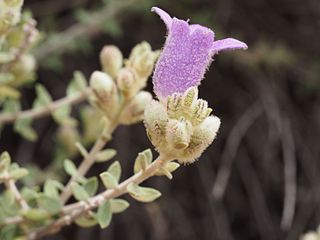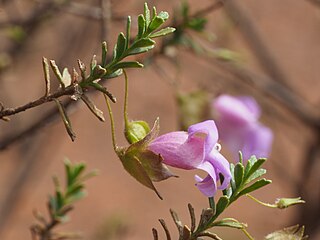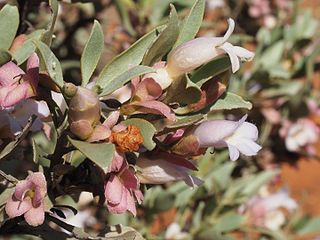Eremophila elderi, commonly known as aromatic emu bush, is a flowering plant in the figwort family, Scrophulariaceae. It is endemic to central Australia where it grows near the border between Western Australia, South Australia and the Northern Territory. It is an erect, aromatic shrub with sticky leaves and branches and usually pale coloured to white flowers. Its specific epithet (elderi) honours an early Australian businessman, Thomas Elder.

Eremophila foliosissima, commonly known as poverty bush, is a flowering plant in the figwort family, Scrophulariaceae and is endemic to Western Australia. It is a small, erect, densely foliaged shrub with long, narrow, hairy leaves and mauve to purple flowers. It is similar to Eremophila gilesii but is more dense and rounded, has more crowded leaves and has different hairs on the flowers.

Eremophila glandulifera is a flowering plant in the figwort family, Scrophulariaceae and is endemic to Western Australia. It is a small shrub with hairy, grey foliage and attractive deep pink to red flowers usually growing in mulga woodland.

Eremophila malacoides, commonly known as frontage poverty bush, is a flowering plant in the figwort family, Scrophulariaceae and is endemic to Western Australia. It is a shrub with grey-green foliage, densely hairy leaves, and usually lilac to purple flowers but a yellow flowered form also occurs.

Eremophila obovata is a flowering plant in the figwort family, Scrophulariaceae and is endemic to Australia. It is a low, compact shrub with lilac to purple flowers growing mainly in the Northern Territory and Queensland but also Western Australia, South Australia and New South Wales.

Eremophila ovata is a flowering plant in the figwort family, Scrophulariaceae and is endemic to the Northern Territory. It is a small, spreading, rounded shrub with hairy branches and leaves and pink or purple flowers which are white inside.
Eremophila pallida is a flowering plant in the figwort family, Scrophulariaceae and is endemic to Western Australia. It is a small, spreading shrub with hairy stems, leaves with a few serrations and reddish purple to violet flowers.
Eremophila perglandulosa is a flowering plant in the figwort family, Scrophulariaceae and is endemic to Western Australia. It is a low, spreading shrub which has small leaves with many glandular hairs and mauve or purple flowers.
Eremophila petrophila is a flowering plant in the figwort family, Scrophulariaceae and is endemic to Western Australia. It is a tall, erect, open shrub with rough branches, narrow, sticky leaves and pale lilac-coloured flowers.

Eremophila phyllopoda is a flowering plant in the figwort family, Scrophulariaceae and is endemic to Western Australia. It is an erect or spreading shrub, sometimes round or flat-topped with sticky, hairy leaves and flowers ranging in colour from pink or lilac to purple.
Eremophila pilosa is a flowering plant in the figwort family, Scrophulariaceae and is endemic to Western Australia. It is a small shrub with many tangled branches, with its leaves and branches densely covered with hairs and which has mauve or purple flowers. It occurs in a restricted area in the Pilbara.

Eremophila punctata is a flowering plant in the figwort family, Scrophulariaceae and is endemic to Western Australia. It is an erect shrub with sticky young branches and leaves due to the presence of resin. Its small leaves usually have a few blunt teeth near their ends and flowers which are usually lilac-coloured. It is a distinctive and widespread species.

Eremophila rigens is a flowering plant in the figwort family, Scrophulariaceae and is endemic to Western Australia. It is an erect shrub with long, stiff, glabrous leaves and pale lilac-coloured to white flowers.
Eremophila setacea is a flowering plant in the figwort family, Scrophulariaceae and is endemic to Western Australia. It is an erect shrub with narrow, glabrous leaves, hairy sepals and light blue to purple petals.
Eremophila simulans is a flowering plant in the figwort family, Scrophulariaceae and is endemic to Western Australia. It is an erect shrub with broad, serrated leaves and violet to purple flowers.

Eremophila ternifolia, commonly known as Wongan eremophila is a flowering plant in the figwort family, Scrophulariaceae and is endemic to Western Australia. It is a low, many-branched, shrub with short, pointed leaves and small lilac-coloured or mauve flowers.

Eremophila tietkensii is a flowering plant in the figwort family, Scrophulariaceae and is endemic to Australia. It is a rounded to flat-topped shrub with grey-green leaves, usually pinkish-purple sepals and mauve, pink or lilac-coloured petals. It is mostly found in Western Australia but also occurs in the far west of the Northern Territory.

Eremophila veneta, commonly known as metallic-flowered eremophila is a flowering plant in the figwort family, Scrophulariaceae and is endemic to Western Australia. It is a low, spreading, sticky shrub with dark green leaves and bluish-green petals.
Eremophila viscimarginata is a flowering plant in the figwort family, Scrophulariaceae and is endemic to Western Australia. It is a small, erect, prickly shrub with hairy stems, small leaves, greenish-pink sepals and mauve petals.

Eremophila warnesii is a flowering plant in the figwort family, Scrophulariaceae and is endemic to Western Australia. It is an erect, compact shrub with furry leaves, hairy sepals and blue to mauve petals. It is a little-known species, named after the founder of the Eremophila Study Group.













